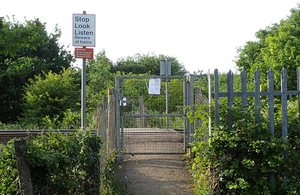Report 07/2018: Fatal accident at Trenos footpath crossing
RAIB has today released its report into a fatal accident at Trenos footpath crossing near Llanharan, Rhondda Cynon Taf, South Wales, 1 June 2017.

Image showing Trenos footpath crossing
Summary
At around 15:50 hrs on 1 June 2017, a pedestrian was struck and fatally injured by a train travelling from Cheltenham Spa to Maesteg, at Trenos footpath crossing near Llanharan, Rhondda Cynon Taf, South Wales. The pedestrian had walked onto the crossing, and did not move clear when the train driver repeatedly sounded the train horn and applied the emergency brake.
Approximately 20 minutes before the accident, another train had stopped at the crossing when its driver observed the pedestrian walking slowly over the crossing. The guard on this train had a short conversation with the pedestrian and, because he was concerned about her state of mind, asked his train driver to contact the signaller by radio. The driver’s radio call was answered by a signaller located in Cardiff who relayed the message to a signaller at Port Talbot who was responsible for the Trenos area. As a result, the signaller was asked to stop trains at signals before the crossing and instruct drivers to proceed at caution when approaching the crossing. Based on out-of-date and misleading information shown on his display screen, the Port Talbot signaller put signals to red on either side of a closed crossing about 0.75 miles (1.2 km) from Trenos crossing. Shortly afterwards, he returned these signals to green, so the driver of the train involved in the accident was not cautioned and the train approached the crossing at normal speed.
The accident occurred because the pedestrian walked onto the crossing and into the path of an approaching train. However, it is possible that cautioning the train in accordance with railway rules would have avoided the accident. It is possible that the Port Talbot signaller’s decision making was influenced by fatigue.
Recommendations
The RAIB has made one recommendation relating to the accuracy of signallers’ displays. It has also identified three learning points. The first relates to the responsibility of staff to both report fatigue to their managers and to arrange their off-duty time so that they have sufficient sleep before the start of a shift. The second refers to the provision of, and familiarity with, up to date reference diagrams needed by signallers, and the third to the importance of signallers recording details about the cautioning of trains.
Notes to editors
- The sole purpose of RAIB investigations is to prevent future accidents and incidents and improve railway safety. RAIB does not establish blame, liability or carry out prosecutions.
- RAIB operates, as far as possible, in an open and transparent manner. While our investigations are completely independent of the railway industry, we do maintain close liaison with railway companies and if we discover matters that may affect the safety of the railway, we make sure that information about them is circulated to the right people as soon as possible, and certainly long before publication of our final report.
- For media enquiries, please call 01932 440015.